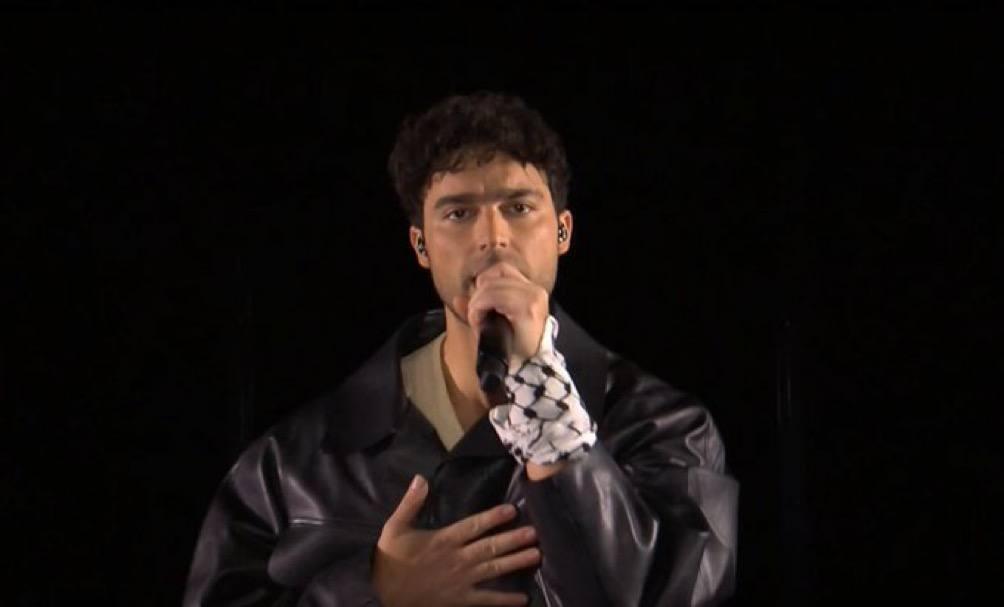Eurovision 2024 has begun, with controversy. The European song contest opened earlier this week with the Turquoise Carpet event, but on Tuesday night, 15 countries competed in the first semi-final on stage in Malmö, Sweden. They aimed to secure a spot among the 10 countries that will advance to the grand final on Saturday night. The broadcast started with a medley featuring various contest participants from over the years.
Swedish singer Erik Saade appeared in the opening act wearing a keffiyeh wrapped around his wrist. Saade, whose father is Palestinian, performed his entry to Eurovision from 2011, titled "Popular."
He was joined in the opening number by Eleni Foureira, the 2018 representative from Cyprus, who performed her song "Fuego." The medley concluded with Chanel, the Spanish representative for 2022, performing a segment from her song "SloMo."
The European Broadcasting Union responded to Saade's act and criticized it in a statement sent to the teams. "Eurovision is a live television show," they wrote. "All performers are aware of the competition rules, and we regret that Erik Saade chose to ignore the non-political nature of the event."
The broadcasting corporation will seek clarifications from the European Broadcasting Union on this matter.
Additionally, the opening segment was not posted on the social networks of the song contest. According to the rules of the European song contest, "Eurovision is a non-political event. All participating broadcasting bodies, including the host body, are responsible for ensuring that all necessary measures are taken among the delegations and teams to maintain the interests of the European song contest, and under no circumstances will there be politicization at Eurovision."
Eurovision organizers announced last week that ticket holders will only be allowed to display the flags of the participating countries, including Israel, and the Pride flag. The contest also emphasized in a message to the Associated Press that pro-Palestinian symbols that may be banned also include "clothes, items or posters that can be used as instruments to be shown on television screens.
A few days ago, Saade shared a story on his Instagram account writing: "When you can no longer wear a symbol representing your ethnic origin in the so-called 'free world,' my participation becomes more significant than ever. The conduct of the European Broadcasting Union is disrespectful. They do not allow any Palestinian symbols inside the hall, while symbols representing other ethnic origins in the world are approved.
"Their slogan - 'United by Music' (unless you are Palestinian) - is a joke, as they broadcast Israeli propaganda in prime-time for the whole world to see, but focus on banning the Palestinian flag. Therefore, it is more critical than ever for me to be present on that stage. You can take our symbols from us, but you cannot take away my presence," he wrote.
At the end of Tuesday's performances, Israeli-bornTali Goulargant, representing Luxembourg in the contest, won a spot in the finals. The singer lived in Luxembourg for 13 years, and at the age of 19 she left her home to study voice in New York, and since she graduated has been teaching voice development in New York. The 23-year-old singer was the last to compete, singing "Fighter," marking the country's return to the competition after 31 years.
Eden Golan, the Israeli representative, will compete in the second semi-final broadcast, which will take place on Thursday. During Tuesday night's semi-final broadcast the Israeli delegation was confined to its hotel only, due to concerns about the chances of violent protests in the city and attacks on Israelis, as warnings about specific attacks against the Israeli delegation are increasing.
Meanwhile, the security ring around Golan and her companions is tightening, using various drills - which are prohibited from publication - to not disclose the location or movement from the hotel and back. At this stage, the singer and her dancers are preparing for the semi-final at the hotel where they are staying, without the possibility of going to other venues due to the tense security situation in the host city.
The Swedish police are concerned that a large pro-Palestinian demonstration might occur in the coming days, potentially even tonight. In a discussion with Ynet, a Malmö police officer said that local pro-Palestinian leaders have promised a turnout of "at least 40,000 people" for the major demonstration. This large gathering is expected to significantly raise the risk of riots.



